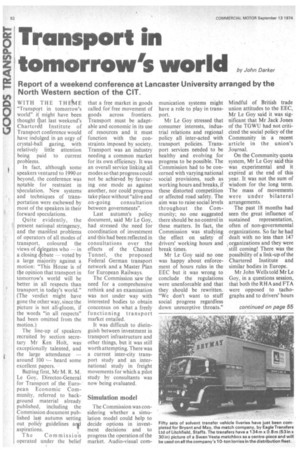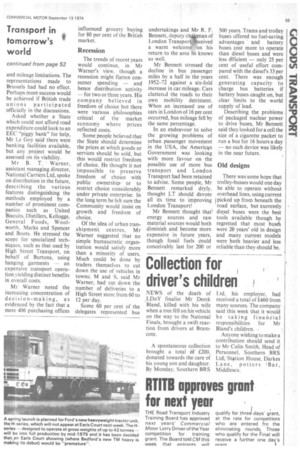Transport in tomorrow's world
Page 54

Page 57

If you've noticed an error in this article please click here to report it so we can fix it.
by John Darker
Report of a weekend conference at Lancaster University arranged by the North Western section of the CIT.
WITH THE THOME "Transport in tomorrow's world" it might have been thought ?Jai last weekend's Chartered Institute of Transport conference would have indulged in an orgy of crystal-ball gazing, with relatively little attention being paid to current problems.
In fact, although some speakers ventured to 1990 or beyond, the conference was notable for ' restraint in • stieculation. New systems and techniques of transportation were eschewed by most of the speakers in their forward speculations.
Quite evidently, the present national stringency, and the .manifest problems of operators of all modes of transport, coloured the views of d•Flegates who — in a closing *bate — voted by a large majority against a motion: "This House is of the opinion that transport in tomorrow's world will be better in all respects than transport, in today's world." (The verdict might have gone the other way, since the picture is not all-gloom, if the words "in all respects" had been omitted from the motion.) The line-up of speakers recruited by section secretary Mr Ken Holt, was' exceptionally talented, and the large attendance — around 100 heard some excellent papers. • Batting first, Mr M. R. M. Le Goy, Director-General for Transport of the Euro• pean Economic Community, referred to background material already published, including the Commission document published last autumn setting out policy guidelines are aspirations.
The Commission operated under the belief that a free market in goods called. for free movement of goods across frontiers. Transport must be adaptable and economic in its use of resources and it must function with the constraints imposed by society. Transport was an industry needing a common market for its own efficiency. It was an overall service linking all modes so that progress could not be achieved by favouring one mode as against another, nor could progress take place without "alive and on-going consultation between governments".
Last autumn's policy document, said Mr Le Goy, had stressed the need for coordination of investment and this had been reflected in consultations over the effects of the Channel Tunnel, the proposed Federal German transport network and a Master Flan for European Railways.
The Commission saw the need for a comprehensive rethink and an examination was not under way with interested bodies to obtain concensus on what a freely functioning transport mallet entailed.
It was difficult to distinguish between investment in transport infrastructure and other things, but it was still worth attempting. There was a current inter-city transport study and an international study in freight movements for which a pilot study by consultants was now being evaluated,
Simulation model
The Commission was considering whether a simulation model could help to decide options in investment decisions and to progress the operation of the market. Audio-visual corn munication systems might have a role to play in transport.
Mr Le Goy stressed that consumer interests, industrial relations and regional policy all inter-acted with transport policies. Transport services needed to be healthy and evolving for progress to be possible. The Commission had to be concerned with varying national social provisions, such as working hours and breaks, if these distorted competition or affected road safety. The aim was to raise social levels throughout the Community; no one suggested there should be no control in these matters. In fact, the Commission was studying the effect on safety of drivers' working hours and break times.
Mr Le Goy said no one was happy about enforcement of hours rules in the EEC but it .was wrong to conclude the regulations were unenforcable and that they should be rewritten. "We don't want to stuff social progress regardless down unreceptive throats." Mindful of British trade union attitudes to the EEC, Mr Le Goy said it was significant that Mr Jack Jones of the TGWU had not criticized the social policy of the Community in a recent article in the union's Journal.
On the Community quota system, Mr Le Goy said this was . experimental and it expired at the end of this year. It was not the sum of wisdom for the long term. The mass of movements were under bilateral arrangements.
The past 18 months had seen the great influence of sustained representation, often of non-governmental organizations. So far he had dealt with no less than 147 organizations and they were still coming! There was the possibility of a link-up of the Chartered Institute and similar bodies in Europe.
Mr John Wells told Mr Le Goy, in a questions session, that both the RH A and FTA were opposed to tachographs and to drivers' hours and mileage limitations. The representations made to Brussels had had no effect. Perhaps more success would be achieved if British trade unions participated officially in the discussions.
Asked whether -a State which could not afford road expenditure could look to an EEC "piggy bank" for help, Mr Le Goy said there were banking facilities available, but any project would be assessed on its viability.
Mr B. T. Warner, assistant managing director, National Carriers Ltd, spoke on distribution in the future, describing the various features distinguishing the methods employed by a number of prominent companies such as United Biscuits, Distillers, Kelloggs, General Foods, Woolworth. Marks and Spencer and Boots. He stressed the scope for specialized techniques, such as that used by High Street Transport, on behalf of Burtons, using hanging garments — an expensive transport operation yielding distinct benefits in overall costs.
Mr Warner noted the increasing concentration of decision-making, as evidenced by the fact that a mere 406 purchasing offices influenced grocery buying for 80 per cent of the British market.
Recession
The trends of recent years would continue, in Mr Warner's view, though a recession might flatten consumer spending — and hence distribution activity — for two or three years. His company believed in freedom of choice but there were various philosophies critical of the market economy where prices reflected costs.
Some people believed that the State should determine the prices at which goods or services should be sold, but this would restrict freedom of choice. He thought it not impossible to preserve freedom of choice with public ownership, or to restrict choice considerably under private enterprise. In the long term he felt sure the Community would insist on growth and freedom of choice.
Of the idea of urban transhipment centres. Mr Warner suggested that no simple bureaucratic organization would satisfy more than a minority of users. Much could be done by traders themselves to cut down the use of vehicles in towns; M and S, said Mr Warner, had cut down the number of deliveries to a High Street store from 60 to 12 per day.
Some 60 per cent of the delegates represented bus undertakings and Mr R. F. Bennett, deputy chtternan of London Transpo ceived a warm welcome on his return to the area he knows so well.
Mr Bennett stressed the decline in bus passenger miles by a half in the years 1952-72 against a six-fold increase in car mileage. Cars cluttered the roads to their own mobility detriment. When an increased use of cars in London of 16 per cent occurred, bus mileage fell by the same percentage.
In an endeavour to solve the growing problems of urban passenger movement in the USA, the American Government was looking with more favour on the possible use of more bus transport and London Transport had been retained to advise. Some people, Mr Bennett remarked dryly, thought LT should devote all its time to improving London Transport! Mr Bennett thought thatl energy sources and raw material sources would both diminish and become more expensive in future years, though fossil fuels could conceivably last for 200 or 300 years. Trams and trolley buses offered no fuel-saving advantages and battery buses cost more to operate than diesel buses and were less efficient — only 25 per cent of useful effort compared with the diesel's 33 per cent. There was enough generating capacity to charge bus batteries if battery buses caught on, but clear limits to the world supply of lead.
Describing the problems of packaged nuclear power to drive buses, Mr Bennett said they looked fora cell the size of a cigarette packet to run a bus for 16 hours a day — no such device was likely in the near future.
Old designs
There was some hope that trolley-busses would one day be able to operate without overhead lines, using current picked up from beneath the road surface, but icurrently diesel buses were the best tools available though he regretted that most buses were 20 years' old in design and many current models were both heavier and less reliable than they should be.




























































































































































































































